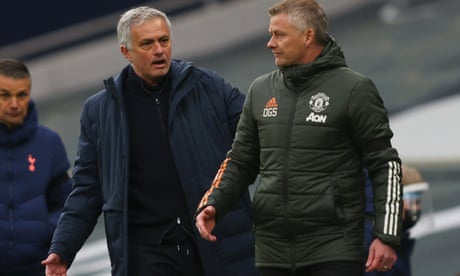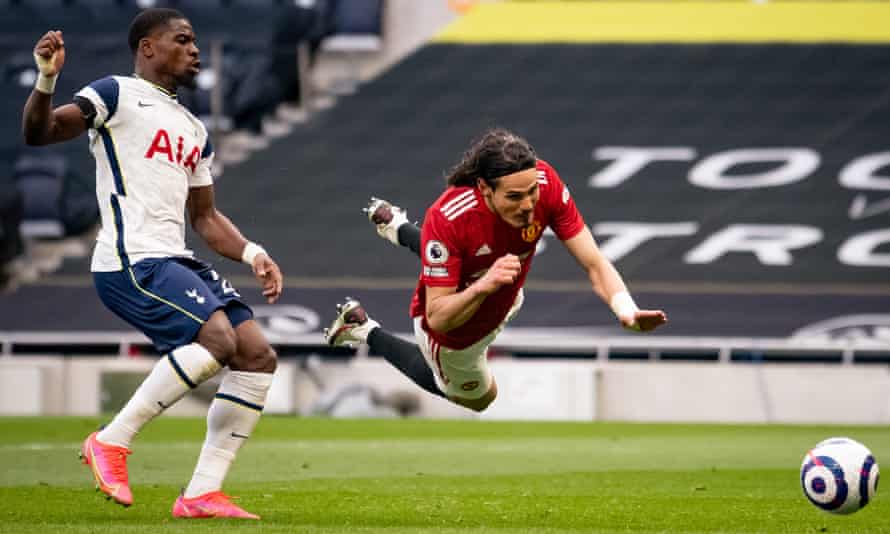Same manager, similar players, same result. The familiar pattern played out again. Tottenham had a lead and Tottenham lost the lead and the result is that the gap to the top four is now six points.
It was the reverse round of fixtures in October – Leeds unnerving Manchester City, West Ham outplaying Leicester, Aston Villa thrashing Liverpool – that created the sense that this was not going to be a normal season, Tottenham’s 6-1 win at Old Trafford even conjuring the frankly implausible thought that Spurs might be able to mount a title challenge. How long ago that seems now. All that remains to be decided, it appears, are the circumstances of José Mourinho’s departure, when it happens and how big his payoff is.

It is striking how different the mood around Old Trafford is now to how it was in Mourinho’s final season, largely because of the personalities of the managers. Like a toxic Charlie Brown, Mourinho bears with him his personal cloud. By this stage in his reign, his focus seems always to have shifted from getting results to making sure nobody blames him for the results. By contrast, Solskjær’s name literally means sunshine. Whatever else may be said of him as a manager, he lifts gloom.
It is hard to avoid the conclusion that he has become a better man-manager than Mourinho, something demonstrated by the way he keeps rehabilitating Paul Pogba after another announcement from his agent that he wants to leave. Mourinho’s attritional low-block may have come to seem outmoded, but at least as responsible for his decline has been the way he seems – these days – to struggle to relate to players. Gone is the shamanic figure who was so attuned in his early years to every detail and every nuance that it seemed he could tell the future, and in its place has risen a cranky headteacher always on the lookout for some errant pupil he can blame for the school’s failings.
Yet Solskjær’s record this season is slightly worse than Mourinho’s in 2017-18: 2.03 points per game to Mourinho’s 2.13, 1.97 goals per game scored to Mourinho’s 1.79, 1.10 goals per game conceded to Mourinho’s 0.74. There may be sufficient green shoots of recovery to have some sense this is a team that is beginning to improve, but before today the only win against a top-six side has been the victory over Manchester City, and many of the wins over lesser teams have been unconvincing scrambles by the odd goal. The difference between this season and three years ago is the sense that progress may yet be made, and a willingness to give the man in charge further time.
There was a danger that with two sides so dedicated to playing on the break that it might end up like the stalemate between United and Chelsea earlier in the season, when both sides were so intent on letting the opposition come on to them and not taking risks that the ball might as well have been left on the centre-spot at kick-off as both sides sat in their own half and watched it. But it was never quite that: if the opening half hour was a grind, it was largely because neither side was good enough to evade the tactical fouling of the other.
But the game was jolted into what seemed sightly unwilling life after 33 minutes, as Edinson Cavani seemed to have given United the lead, only for the referee, Chris Kavanagh, to decide, after consulting the video screen, that the brush of Scott McTominay’s fingers in Son Heung-min’s face as he stepped away from him in the buildup constituted a foul. Mourinho patronisingly consoled Solskjær, a reminder of the virtuosity of old; other gifts may be deserting him, but at faux-magnanimity, Mourinho remains a master.

Edinson Cavani scores Manchester United’s second goal with a diving header. Photograph: Ash Donelon/Manchester United/Getty Images
And then, the most unexpected of happenstances – not only a Spurs goal but one of luminous quality. Perhaps Victor Lindelöf helped by getting his feet in a tangle, but after Serge Aurier had swept the ball forward, the interplay between Harry Kane, Lucas Moura and Son, who was left to roll the ball in, was slick and incisive. But it was also entirely out of keeping with the toil in cul-de-sacs of the rest of the game.
Far more predictable was what came next. For Spurs, taking the lead is like a character in Treasure Island being passed the Black Spot. Their demise becomes inevitable. The pattern laid out against West Ham, Lask, Crystal Palace, Liverpool, Wolves, Fulham, Arsenal, Dinamo Zagreb and Newcastle was followed again.
As Spurs sat deeper, United began to play with fluency and imagination. After a couple of decent blocks from Hugo Lloris, the equaliser arrived 12 minutes into the second half, Fred knocking in the rebound after Cavani’s effort had been saved. Cavani, superb throughout, got the second with a diving header from Mason Greenwood’s cross. He did then head against his own post as Pogba flicked on a Spurs corner but the game was not to be shifted from its destiny and Greenwood added a late third.
And so the Mourinho doom-spiral took another turn nearer the conclusion everybody suspects is coming.

















